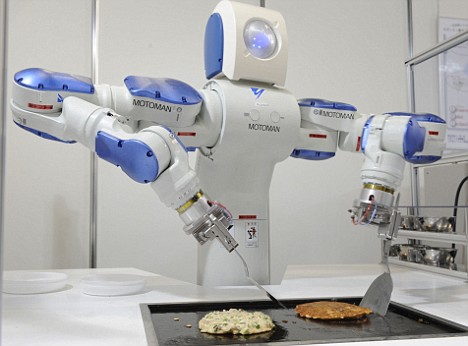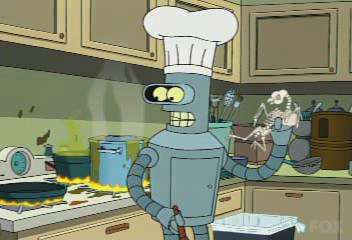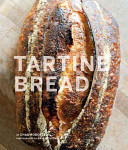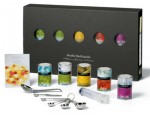We are The Robots

Scientists are pushing hard to make kitchen appliances more “intelligent” and increasingly independent, requiring less and less user interaction. It no longer seems like an if, but rather a when will we cross the line between having just a smart kitchen appliance and a fully independent kitchen robot, maybe even of humanoid design? Could chefs and robots be working shoulder to shoulder in restaurant kitchens in a near future, or will the the quest for low-wage (or no-wage) unrelenting workers completely chase humans out of the kitchen and into mere supervising roles?
Would we accept robot-made food becoming a future standard? A realistic picture of the large food industry I’m sure, but wouldn’t you disapprove of having your upscale restaurant meal cooked by a machine?
Will it ever be possible to make a robot think outside the box?
Recently Evan Selinger and Evelyn Kim discussed the matter of robot cooks and their hardship to acquire tacit knowledge in their article “Can a Robot Learn to Cook?” in The Atlantic
There are a great many aspects on the theme of advanced robots in the kitchen, but the most interesting one to me is the one concerning tacit knowledge - skills and know-how embedded in personal experience, hard to transfer to another person and often virtually impossible to express accurately in words.
Would a robot ever be able to replace a chef?
First of all we need to understand that not all cooking is the same. Home cooking, industrial cooking, chain restaurant cooking, café cooking, street cooking, Michelin star cooking. They are all very different and require different instruments and considerations in their respect. Robots could surely replace or complement chefs in certain situations and in certain types of cooking.
We know that robots are already making a lot of food, especially in the industrialized food sector. Butchering, cutting meat and fish, washing, stirring, cooking, frying, baking and packing are some things that are all automatized. One of the aspects with robot-made food is that robots (or simply machines) are specialized in performing one single task, and do not have the versatility of a human chef. I don’t doubt the quality of robot-made food. On the contrary, monitoring hygiene and cleanliness is easier with machines than with human beings. More, a machine could for example work in a chilled environment to minimize the risk of food spoilage, something that a restaurant cook cannot always do.
Situations where robots might come in very handy are found in the kitchens where production is based around many repetitions of the same task or the same dish. Think banqueting, institutional caterers and canteens. Here the human would to a certain extent take on a part as supervisor, with the bulk of the work being executed by machines.
Cooking at higher levels of cuisine is, however pretentious it may sound, closely related to other art forms. Their relationship stem from the desire to create and innovate, to produce something unique, but most of all from the inherent wish to express something truly personal. To reach the higher peaks in cooking (as any truly great chef) one must have a story to tell (and a concept to sell). Error 412 - robots have no story to tell.
Could a robot make a painting - not a copy of a painting - but a real painting made out of experiences, ideas, dreams and feelings while playing around with color choice and techniques? Does any such thing as an artistic robot exist? If concurrently looking at a copy of a painting and its original - I might see the same thing, but what I feel is different. Knowing that behind the original lies a human mind, a person, complete with imperfections and all, lends a bigger value.
The same goes for food - surely, eating industrial, mega-production food would stop my stomach from growling, but when I’m aware of eating something prepared by an actual human being, preferably with passion, the feeling is different. And I’ll probably pay 10 times as much too. Humans need paychecks, robots don’t.
I think, and hope, that robots will not replace chefs, but there’s nothing saying we couldn’t share the same space working alongside one another.
A human chef is such an incredibly complex creature thanks to the way we can combine our advanced senses and analytic thinking in a million ways.
A robot substitute would need such a huge amount of sensors, functions, processing units and artificial intelligence to even come close to a chef with a medium-sized brain, that the whole thing seems highly unlikely to me.
A much better idea would be the cooperation with specialized robots executing specific tasks or handling particular situations alongside the real chefs.
Talking about robots cooking, here’s a video that totally gives me the creeps:
After having focused on the topic Robot vs Chef, please explain, what does it actually mean to be a chef?
The truth is, chefs can also be robots sometimes. In some cooking there is no art element, blindly following a recipe or cutting meat and veggies in a certain pattern does not leave room for any ‘ad lib’. Imagine a cook in a chain restaurant outlet wanting to give a little personal “touch” to the dishes. Goes without saying that it would be out of question. But if we talk about a different level of cuisine, our sense of taste and the ability to assess flavor compatibility becomes much more important, and there is a higher percentage of ‘ad lib’ work, tasting, seasoning and adjusting, often with the base recipe settled by fixed measurements.
As you continue further up the scale of the various cuisines you will reach a point were the act of performing well, over and over again is just not enough. In addition to a job well done, there are boundaries to be pushed.
Even given that we all have different taste, in all cooking there are still culinary standards to aim for.
A cutting-edge chef though, is responsible not only for reaching up to these culinary standards, but ultimately changing these standards, making us look at food in new ways.
Would the introduction of robots in the kitchen ultimately change what it means to be a chef?
In some ways definitely so. In the future a chef’s job might become less physical and more intellectual. Robots would be able to take over some of the “less rewarding” tasks, the purely mechanical ones where no human mind is needed. In that way the chef, and not least the other human cooks in the kitchen could free up time to concentrate on performing more advanced assignments. On the other hand, in many restaurants, I’m sure, this readily available workforce of perpetual energy would lead to lay-offs in money-saving efforts to maximize margins. This is exactly what has already happened in many other professions.
Implicit knowledge
Why did recipes in old cookbooks always say to use a copper bowl when beating egg whites? Chefs knew that the egg whites were superior when beaten in copper, but no one could tell you why.
Not until recently was it explained that copper ions form a strong bond with the conalbumin in the egg white, thus producing a much more stable foam.
Much of the knowledge that a chef possesses is of the implicit type, something quite abstract. These are things that after a number of years of work in the kitchen is “just there”. You might not know how you learned it nor when you learned it. You use this knowledge it to execute tasks and resolve situations around the kitchen everyday.
This type of knowledge goes way beyond the usual and straightforward cause-and-effect knowledge but still has its roots in the latter.
It’s also this type of knowledge that is hard, sometimes even impossible, to teach and transfer to another person.
Mentoring is one way, a shortcut as such, since it limits the experience required from the apprentice to obtain a certain knowledge. Mentoring is a fast way to let the trainee “tap in to” the mentors experience and consequently in a faster way acquire similar knowledge. Though no matter how good your mentor is, acquired experience can never be transferred to the apprentice, but the lesson learned by the experience process can.
Most chefs know very well how important mentoring is when it comes to developing new skills, progress in the kitchen hierarchy and to one day grow from cook to chef.
But could you upload 10, 20 or 40 years of in-kitchen experience to the CPU of a newly built robot?
The work of the chef is very much a logical process, revolving around things and facts that are easy to describe, monitor and explain. But there are also the other side - a much more inspirational, creative job that’s all about feeling and intuition - trying to transmit not only flavors but also emotions and the chef’s philosophy.
Top chefs are driven by curiosity and passion, an ambition to please their guests and a wish to show off newly invented creations.
Could all the aspects of cooking be replicated by machines or technology?
Surely most of the mechanical tasks in the kitchen could be executed by a robot, some of them already are today, and some will be in the future with further progress in the field of robotics. But when will you be able to let a robot also take over the creative tasks, assignments that require personal views to be taken into account?
Would you like to discuss wine pairings with a robot, without the human values, personal experience and opinions of a sommelier?
A lot of knowledge can be codified and expressed in personal instructions, recipes or robot programming. But what about all that “other” knowledge?
Things that will be hard for a machine to learn are the processes and tasks where a human being uses many of its built-in “tools” to receive sensory data, process the information in the brain, always based on knowledge and experience, comes to a conclusion and act upon it, also taking into account a variety of variables connected to the kitchen, ingredients and maybe even the end-user, the eater.
Tacit knowledge applied in the kitchen might be as simple as correctly seasoning a dish - but how would a robot know what is “just right”?
Sometimes the success of a recipe used for the first time depends on the ability of a skilled cook to “fill in” gaps in the recipe where it isn’t detailed enough for the novice cook to succeed.
But one of the most fascinating applications of tacit knowledge to me is to be able to “taste” the result of a recipe, just by reading it!
Most of this knowledge needs to be acquired, not only by seeing and replicating, but by seeing, replicating and ultimately understanding. Is a robot capable of having an “aha moment” - representing that short instant when all the pieces of the puzzle suddenly comes together and you learn a lesson for life?
Other things that will be very hard to implement in robots is the ability to make decisions based on personal judgement. Would a robot be capable of determining if the fish delivery is fresh enough or it needs to be sent back? If a cucumber is crispy enough? Where to trim the asparagus stalks to get rid of the woody ends? If a piece of meat has been seared enough or if it needs another 10 seconds in the pan? If an emulsion is emulsified or is beginning to split? Problems might arise when the answer to a question or a problem is not simply “black or white”.
Another field where machines so far cannot compete with humans is creativity. A robot cannot dream up a new dish for tomorrow’s menu. It could surely combine ingredients and cooking techniques in random or systematic patterns with the help of databases and basic flavor pairing - but the human brain is way more complex than that, and has a less limited creative freedom.
On creativity, it all boils down to this: Will it ever be possible to make a robot think outside the box?
Cooking with your (robot) heart
Humans are so incredibly complex beings, which has its positive sides but of course also its negative sides. Our intricate interaction between physics and brain makes us achieve things, that in any other animal or machine for that matter, would be impossible. In advanced cooking the brain has its natural place, as does fine motor skills, but you won’t get far with only this. The chef needs a heart too. The old saying “put some love in your food” is not without reason. Cooking with your heart for me represents a wish to always do your best, always give more than you take and to offer something that has a higher value than the sum of the ingredients on the plate.
Until someone creates a robot that moves like human, thinks like a human but most importantly, in its own eyes feel like a human - we will only have specialized “robot helpers” in the kitchen.

What part of cooking could be helped by technology?
In their article Evan Selinger and Evelyn Kim were talking about progress in the chicken butchering area.
I’m quite certain that a robot could be designed to butcher whole chickens (as well as any human chicken processor) - perhaps not by following a pre-programmed pattern, but rather by combining a computer-generated model based on 3-dimensional x-ray with flexible cutting tools and dynamic programming. We might not see it tomorrow, but the possibilities exist.
I imagine that a robot in the everyday work in a kitchen, apart from simple mechanical duties, could be able to analyze and control things like saltiness, acidity, temperature, firmness, color.
But would it be able to make smaller adjustments based on occasional circumstances?
Could it take into account that a cut of meat has a slightly different muscle structure today as opposed to yesterday? The apples might be floury, the tomato not sweet enough.
Can a robot take into consideration a guest’s special needs, likes or dislikes? Could it translate praise from a diner about the Asian flavors during the last meal into a wish of doing something even better and therefore tweaking the duck dish with galangal, star anise and palm sugar glaze?
On the other hand, the big advantages with robot workforce are quite clear: Robots are not subject to fatigue, to fear, to anger. Robots don’t loose interest, don’t get into fights, don’t complain, need not be fed. Stress does not change the behavior of a robot as it does a human. Robots does not need praise or love to feel good.
But could a robot taste a finished dish and go: “Wow, this tastes wonderful together!”?
Speaking of robots and their possibility to acquire new skills on their own:
How much knowledge needs to be already in the robot by programming and how much would it be able to learn as time goes by? (provided the hardware is adapt for the new tasks)
In some ways we already have a move towards machinery-backed kitchens with equipment such as intelligent ovens, immersion circulators, pacojets and thermomixers.
Today’s ovens have functions that go beyond simple cooking with auto-start, auto-off, self-cleaning and a number of automatic programs that takes into account both temperature and humidity. But at the end of the day, it’s still just a finely tuned heat source regulated by computer programs. You couldn’t ever teach it to make a cup of coffee, debone a leg of lamb or to take out the trash before it shuts itself off for the day.
In an article in Slate magazine, Evgeny Morozov argues that you wouldn’t want too much help either in the kitchen, since it would actually risk making us worse cooks by depriving us of culinary challenges. Morozov writes about scientists developing helpful surveillance systems which guide the cook through the different steps of a recipe by projecting instructions and symbols onto the ingredients and workspace.
Is there anything in a chef’s job that might require long periods of training to get right?
Many things, definitely. For example, I am very fond of artisan bread baking, and it takes a lot of experience (a good recipe helps a lot too) to be able to recognize what’s happening in a bread dough in its different stages and whether or not things are going as expected. When baking in a normal restaurant kitchen there are so many variables that could make you trip on your way to a good result. The flour might be very dry, or contain high amounts of humidity. The room temperature might be a few degrees higher or lower than yesterday. The sourdough might be weaker today and stronger tomorrow. The ater might be warmer or colder than usual. The fresh yeast might have lost a bit of its strength.
I’ve never had any teacher in bread making, so all knowledge is from hit-or-miss experiences using written and non-written recipes. My first memories of baking bread by myself are from the age of 15 I guess. I remember meticulously following the recipes, one in particular, but I ended up with different results every time. Very frustrating to not understand the mechanisms behind it all, and what caused these random (so it seemed at the time) results. I have during my years in the kitchens made lots of bread - relying on a generous pinch of luck to get good results. It is actually not until during the last years that I have come to understand the processes that transforms flour and water into the beauty we call bread. My insights comes through technical literature and hands-on experience, but unfortunately without a mentor. A lot of this knowledge are things that are almost impossible to describe in text and you simply need to experience it. It’s an incredibly complex mechanism that most chefs wish they knew more about. But once you have acquired a certain amount of knowledge about the happening behind the scenes of the dough, you manage to see, understand and correct problems before they happen. Result: Better bread.
Are there parts of cooking that a machine will NEVER be able to replace?
An incredible amount of what we know in cooking (science of cooking, procedures, methods, techniques) are all results of trial-and-error during thousands of years. The same goes for science in general - many important discoveries comes from curiosity, trial and error and a bit of coincidence or luck.
A machine does not make mistakes and can consequently not make progress in this way.
The difference between machine and man is the wish to evolve, the ambition to always raise the bar a notch or two and the urge to each day get better and better at what you do.
A machine will do what it’s been told or programmed to do, whereas a chef will (hopefully) always try to do things a little bit better every day, a little bit faster, a little bit tastier, a little bit more beautiful.
Moreover, a problem for future robotic chefs might be the fact that certain things in the learning process one has to understand by oneself - they are impossible to transmit by words or act (or a data cable). Only with understanding and contemplation can these things be “learned”. A simple example: I can teach you about communism, but I can never teach you to think like a communist.
My general standpoint on technology in the kitchen is that as long as science doesn’t strangle creativity and the wish to progress, I’m all for it.
And in any case, should there be problems - just pull the plug!

